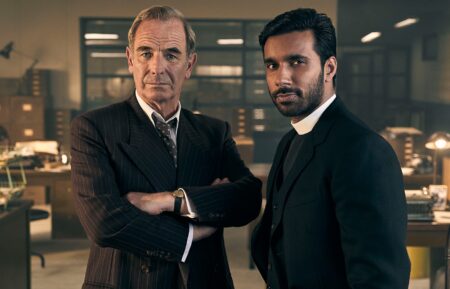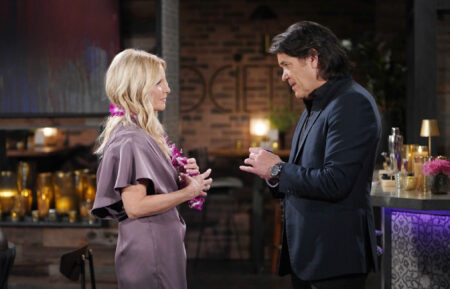The Women of ‘The Witcher’ Say to Hell With Tradition in Episode 4 (RECAP)
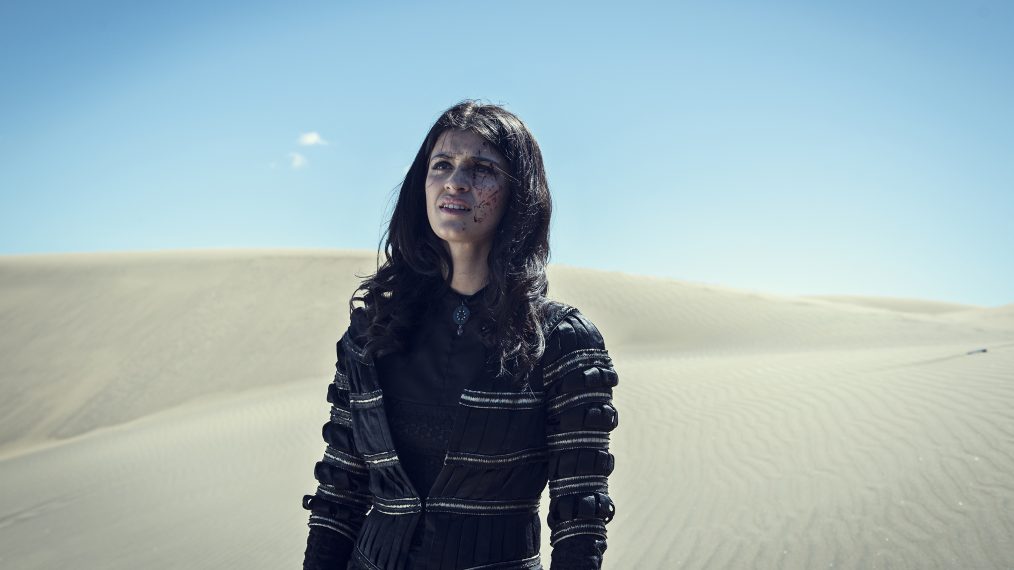
Spoiler Alert
[Warning: The below contains MAJOR spoilers for The Witcher Episode 4, “Of Banquets, Bastards and Burials.”]
So far, I’ve commended The Witcher for its incredible fight scenes, its stellar performances, and its surprisingly dry humor. But there is another facet of the show which deserves more appreciation — its strong female characters. The women of The Witcher are not just prissy princesses, innocuous love interests, and damsels in distress, they are tenacious, multi-faceted characters who refuse to follow fantasy-drama conventions.
“Of Banquets, Bastards and Burials” (written by Declan de Barra) is an episode that puts women at the forefront of the story. It’s an episode that explores the treatment of women within the Witcher-verse, the expectations thrust upon them, and the ongoing fight against those expectations. It’s a fight that, at times, seems unwinnable. “We’re just vessels,” Yennefer (Anya Chalotra) says towards the end of the episode, talking of womankind. “Even when we’re told we’re special… we’re still just vessels, for them to take and take until we’re empty and alone.”
The last time we saw Yennefer, she’d put herself through a brutal procedure, where she’d given up her right to bear children, all in the name of becoming beautiful and powerful. But now three decades later, serving as King Virfuril’s (Ben Lambert) mage, Yennefer realizes she was sold a neatly packaged lie. “I believed it would be worth it, that this would be my legacy, the greatest mage to ever grace court,” she laments. “Instead, I’ve spent the last three decades cleaning up stupid political messes. A glorified royal arse wiper.”
Yennefer was never allowed to attain real power or influence because that’s not the way the system is set up. Her job is basically that of a babysitter. In this episode, she chaperones Queen Kalis (Isobel Laidler) and her baby daughter in a carriage back to the kingdom of Lyria. She slumps in her seat, glumly listening as Kalis complains about her horrible life and her husband’s disappointment that she hasn’t provided him a son. “I’m just a womb to him,” Kalis remarks. “No more than a fleshy contraption for squeezing out heirs.”
Kalis tells Yennefer that she made the right choice giving up her chance to have children. “People look at you for who you are, not what you can give them,” she says. But Yennefer knows that is bulls**t. Nobody has ever truly looked at her for who she is; otherwise, she’d have been appreciated when she was the “hunchback” farm girl — before she became the gorgeous witch with magical powers. Even now, Yennefer is still viewed in terms of what she can provide, in this case, protection, which Kalis admonishes her for when the carriage is attacked by an assassin and his giant killer insect.
There’s an excellent chase sequence, as Yennefer portals herself and her royal companions from the middle of a forest, to golden deserts, to rocky mountain terrain. But they continue to be tracked by the mystical hit-man, who Yennefer surmises has been sent by the King. “You ran out of chances to provide your King a male heir,” she tells Kalis. “You useless witch, you were supposed to protect me!” the Queen yells. And for that ungrateful remark, Yennefer abandons the situation, leaving a desperate Kalis to try and bargain with the assassin, even offering to sacrifice her own child to save herself. It doesn’t work, Kalis is killed with a dagger to the neck.
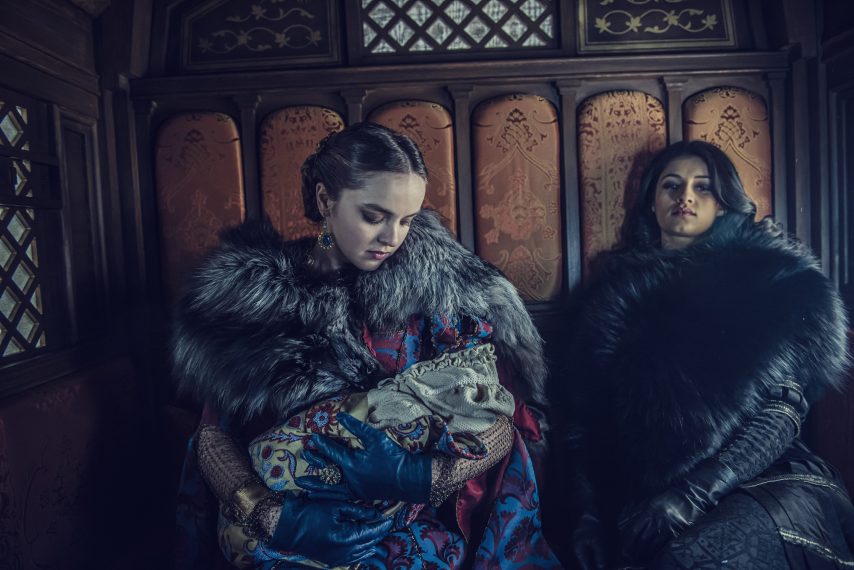
Netflix
Yennefer does return to try and save the baby, slaughtering the beastly bug in the process and then portaling out of harm’s way. Unfortunately, it’s too late for the child, all that teleporting took its toll. Yennefer tries whispering a spell to bring the baby back to life but to no avail. It’s a bleak scene, especially as Yennefer buries the girl on the beach, an act symbolic of her own inability to have children. Yet, in all her cynicism, Yennefer sees this as a potential blessing — an escape from a world where women don’t stand a chance. “You’ve cheated the game and won without even knowing it,” she tells the lifeless child.
The fate that would have likely befallen that baby girl is seen in Geralt’s (Henry Cavill) storyline this episode. Jaskier (Joey Batey), the irritating bard, is back and wants to cash in a favor for “making Geralt famous” via his hyperbolic ditties. He wants Geralt to accompany him to a royal banquet as his bodyguard, as he knows there will be many upset Lords there who want to hurt him for sleeping with their wives and/or mothers. Geralt reluctantly agrees, which is great for us because it means more Witcher and the bard banter. “I’m not your friend,” Geralt grunts from a bathtub. “Oh really, you usually just let strangers rub chamomile onto your lovely bottom?” Jaskier replies.
But this banquet isn’t about Jaskier and his bedroom conquests. This is a royal function held by Queen Calanthe of Cintra* (Jodhi May), and its intention is to find a suitor for her daughter, Princess Pavetta (Gaia Mondadori). Calanthe is a well-respected and much-feared Queen; she’s earned admiration by continuing to fight on the battlefields when she could quite easily put her feet up and sit on her throne for the rest of her life. You can sense the strength of her character as she marches into the royal party, adorned in armor, half-sozzled, and smeared in the blood of her enemies.
*This proves that the Princess Ciri (Freya Allan) story-thread is happening after the events of Geralt’s arc. Not only is Calanthe still alive here, but Ciri isn’t even born at this point in the story.
However, despite Calanthe’s title, and the respect she’s garnered from her subjects, she still has to operate within a world ruled by the male species. This whole thing about marrying off her daughter is straight from the traditions of men. Pavetta doesn’t want to get hitched to some “boorish lout” that she doesn’t even know just so Cintra can continue to hold power after her mother passes. But she doesn’t have a choice in the matter. “You think I wanted to marry your father?” Calanthe tells her, recognizing the ridiculousness but abiding by it regardless. “You can have who you want after you’re married.”
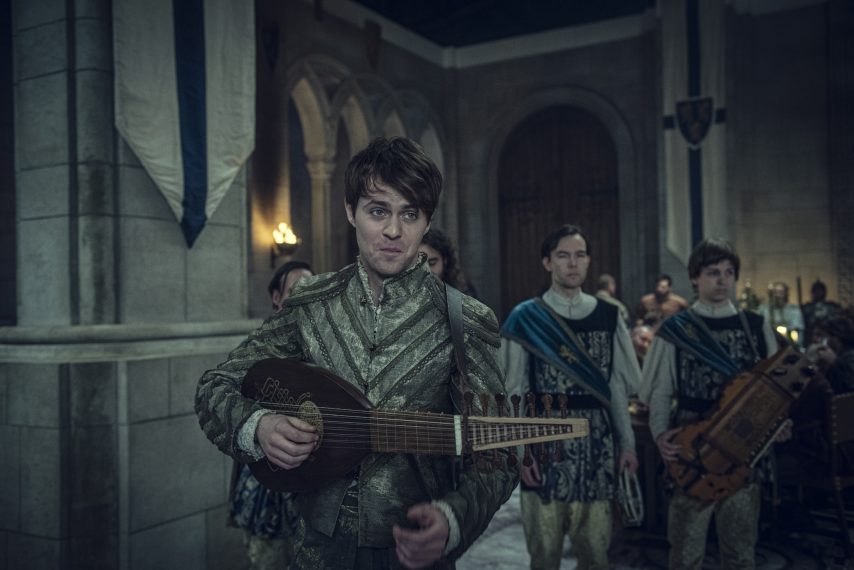
Netflix
The event goes ahead, with potential suitors approaching the head table and pleading their case to Pavetta, all the while Calanthe scathingly critiques their efforts like she’s a judge on American Idol. “All of this because male tradition demands it,” Calanthe remarks to Geralt, again, acknowledging how preposterous this all is. But when an unknown admirer makes his presence known and demands Pavetta’s hand in marriage, all the frivolities soon slip away as the party descends into violent chaos.
That secret lover is Lord Urcheon (Bart Edwards), aka Duny, a cursed knight who was turned into a weird hedgehog-human hybrid (think of the first Sonic the Hedgehog trailer, but less blue). Duny announces that he has come to claim what is rightfully his by the Law of Surprise. Calanthe is not amused and demands Geralt kill it — as if Duny is some sort of diseased rodent. Geralt refuses, reasoning that Duny is not a monster but merely a knight struck by a curse. A mass brawl breaks out when a Cintran guard attempts to kill the abominable knight, forcing Geralt to step in and save Duny’s life.
Once Calanthe calms everyone down, Duny explains his situation. He was cursed as a young boy and lived his whole life in misery, until one day, he saved King Roegner (Calanthe’s late husband). As payment for his good deed, Duny invoked the Law of Surprise, an ancient law that promised him whatever windfall the King had left at home “without knowing or expecting it.” Roegner returned to find he was expecting a child, Pavetta, who would, therefore, become Duny’s reward. Now, Duny never intended to cash this in, as he didn’t think any woman would accept him until the curse was lifted. But fate intervened, and he and Pavetta ended up meeting and falling in love anyway.
Calanthe is furious and refuses to sign off on the marriage, despite what her daughter or destiny dictates. “Is there not a man amongst you who does not cower before destiny?” the Queen bellows. Geralt isn’t afraid of destiny; he doesn’t even buy into it. “It’s just there to help people believe there is an order to this horses**t,” he says. But when Calanthe attempts to kill Duny, destiny does interrupt, as Pavetta lets out an almighty, ground-rumbling scream, similar to what we saw from Ciri in the first episode. The vibrations send the onlookers flying, as Pavetta and Duny levitate above the room. It takes a combined effort by Geralt and Mousesack (Adam Levy) to break Pavetta’s spell.
“Do you believe in destiny now?” Lord Eist (Björn Hlynur Haraldsson) asks Calanthe. The Queen is shocked but also proud of her daughter, a young woman with great power who refuses to follow tradition. “I thought your grandmother’s gift had skipped you, as it did me,” Calanthe says, which I guess means Pavetta (and Ciri) isn’t a Witcher, but something else entirely. In the aftermath, Calanthe announces that the Law of Surprise will be honored and binds Pavetta and Duny in marriage, a blessing which lifts the afflicted knight’s curse.
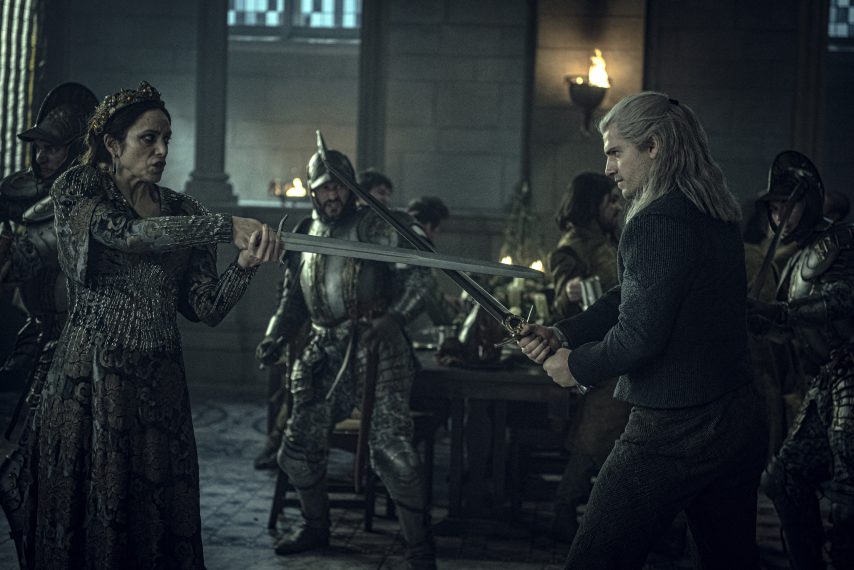
Netflix
Of course, the big revelation here is what happens after the knot is tied. Duny tells Geralt he owes him a debt for saving his life, and while the Witcher says it isn’t necessary, Duny insists. “Fine, I will claim what you did, the Law of Surprise. Give me what you already have but do not know,” says Geralt, not expecting the debt to come of anything. Then, in a hilarious bit of timing, Pavetta throws up, implying that she’s pregnant with Duny’s child, who we have to believe is Ciri. “F**k,” Geralt utters. So I guess we now know how Geralt and Ciri’s destinies are connected, even if Geralt has no intention of sticking around to claim the child (“I want nothing. I need no one. And the last thing I want is someone needing me.”).
Speaking of Ciri, she continues her journey into the enchanted forest of Brokilon, where she meets the Dryads, an all-female species who “fought off mutants and men.” While this story ties in nicely to the episode’s female-empowerment theme, there is a lot of mysticism and mythology here that is hard to follow. The main takeaway is that newcomers to the forest must drink from the Waters of Brokilon. If they are pure of heart, they will survive and forget their past, but if their intentions are evil, the water will kill them.
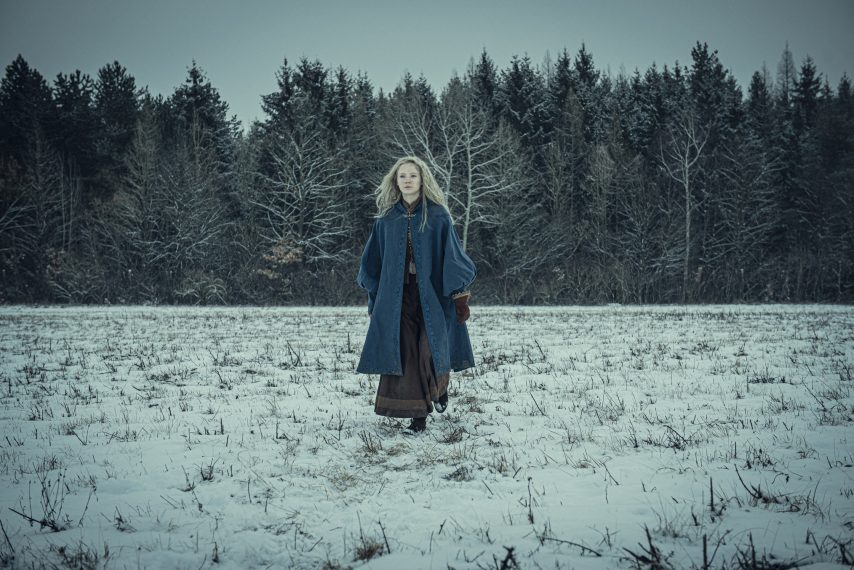
Netflix
Ciri’s story-thread is the weakest of the three right now. It’s not bad, per se, and Freya Allan is doing some superb work as the lost and confused princess, there’s just not as much happening compared to Geralt and Yennefer’s arcs. The scene where Ciri tells Dara (Wilson Radjou-Pujalte) who she is is strong, particularly when she finds out what her grandmother, Calanthe, did to Dara’s people. “You should start thinking for yourself,” says the young elf boy. “Your grandmother is dead. You are here.” In many ways, Ciri is like her mother, Pavetta, a reluctant princess who fought against her own mother’s rules and traditions.
But the rest of Ciri’s arc is a little befuddling, especially when she drinks the water and is transported to a desert at night, where a shining tree appears to ask, “What are you, child?” I’m assuming this is a hallucination of some sort, but given that teleportation is a thing in this series, I can’t rule out that Ciri is actually in the desert with a talking tree. However, I’m not too concerned right now because The Witcher has earned a lot of goodwill. And given the pace of the season so far, I don’t suspect we’ll have to wait too long for Ciri’s story to pick up.
While “Of Banquets, Bastards and Burials” never reaches the heights of the exhilarating “Betrayer Moon,” it’s a crucial episode in connecting the dots, explaining Witcher-verse traditions, and, most importantly, establishing the show’s excellent female characters.
Additional Notes
- In Ciri’s timeline, we see the burning aftermath of the Nilfgaard attack on Cintra. One Nilfgaard dude slices off a chunk of Calanthe’s skin, eats it, starts seizuring and is then stabbed and gutted by a fellow Nilfgaardian. Not sure what the hell is happening here, but it appears to be some kind of strange ritual to track Ciri’s whereabouts. And it works, because they realize Ciri is currently in Brokilon forest.
- During the Nilfgaard scene, we also see that Calanthe’s former sorcerer/adviser, Mousesack, has been taken prisoner (he appears to grab an item of clothing from Calanthe’s body before he’s dragged away).
- Jaskier not wanting anyone at the banquet to know who Geralt is, only to be immediately recognized by Mousesack, got a big laugh from me. As did Mousesack’s comments on the outfit Jaskier made Geralt wear. “Why are you dressed like a sad silk trader?”
- “All I can hope for you, good lords, at your final breath, is a s**tless death. But I doubt it.” Geralt’s party patter is top-notch.
- During his chat with Queen Calanthe, Geralt briefly mentions that it’s no longer possible to create more Witchers “after the sacking of Kaer Morhen.” I’m not sure yet what Kaer Morhen is, or what happened there, but it’s significant to learn that Witchers are essentially a dying race.
The Witcher, Season 1, Streaming, Netflix









